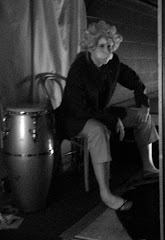
The title of this novel by Patricia Marx doesn't exactly trip off the tounge. I referred to it, as I was reading it, as "the orange book by that funny lady who wrote for the Lampoon about the guy." A big improvement, eh?
Him Her Him Again, etc etc, is the story of the narrator's obsession with her first serious boyfriend, Eugene Obello. They meet in Cambridge, England, date for a little bit, but most of the novel is about their relations after Eugene has left her for another woman, married and had a baby. This makes the book sound very serious and heart-wrenching. It is not. In fact, it is very very funny.
This novel perplexed a lot of reviewers who felt moved to write comments like, "Why should we care about Eugene and the narrator? He's a total jerk and we can't believe she still likes/and or obsesses over him?"
There is certainly a school of comedy and comedic writing that believes in grounding the material in an emotionally real circumstance. The Lampoon style is not that way - it emphasizes the joke - the artful construction of the joke. In some senses, the joke in the abstract: without using a reference in the punchline or the set-up, without alluding to a current event how do you just make a joke?
Marx is using the format of the resurgent chick-literature in part to satirize this genre of writing wherein successful women search in a bumbling manner for romance and lots of silly things happen to them that you can totally relate to. Bridget Jones was the catalyst for this movement: and that book was hilarious and managed to capture our narcissistic obsessions about finding a relationship that meets our modern demands. The books that have followed Bridget Jones in an effort to capture the large market of women who like love stories that are like their own but with happier endings, have left some of the complexities of character behind and all appear to have put a lot more shopping in. Their covers in bookstores always have titles like "Shopping For Mr. Right" and then an illustration of legs and high heels in bright colors. On the back the description begins "Kelly Marksville thought she had it all: a job in graphic design, a loft in Chealsea and a great boyfriend until blah blah blah blah" - boyfriend leaves (jerk!) she gets over him, turns out graphic design wasn't it, moves, new guy, she starts a store. End. A diluted, sad, place for what could be a generally good, funny genre.
Marx doesn't do that large journey: this is just the focused story of a love affair, told like a friend was telling it to you except with many more hilarious observations and asides. And the narrator is a total neurotic and afraid she is a failure, something I can always relate to.
My favorite moments included the recounting of a pitch session at a faux-SNL type show called "Taped But Proud," and the following few quotes. I'm paraphrasing but bear with me, "Your Mother is right said my grandmother and also tell her I've always hated the yellow table in her front hall." "Good news, he said. I knew enough at this time to know that good news for someone is bad news for someone else. Usually me." And my favorite, "The comment came out the way I meant it: the truth hidden within a joke."
Nice.
It's fun. It's a short read. Yes, the lack of empathy you feel for the characters does start to slow it down in the last third of the book, but read it as a comic piece and enjoy it.



